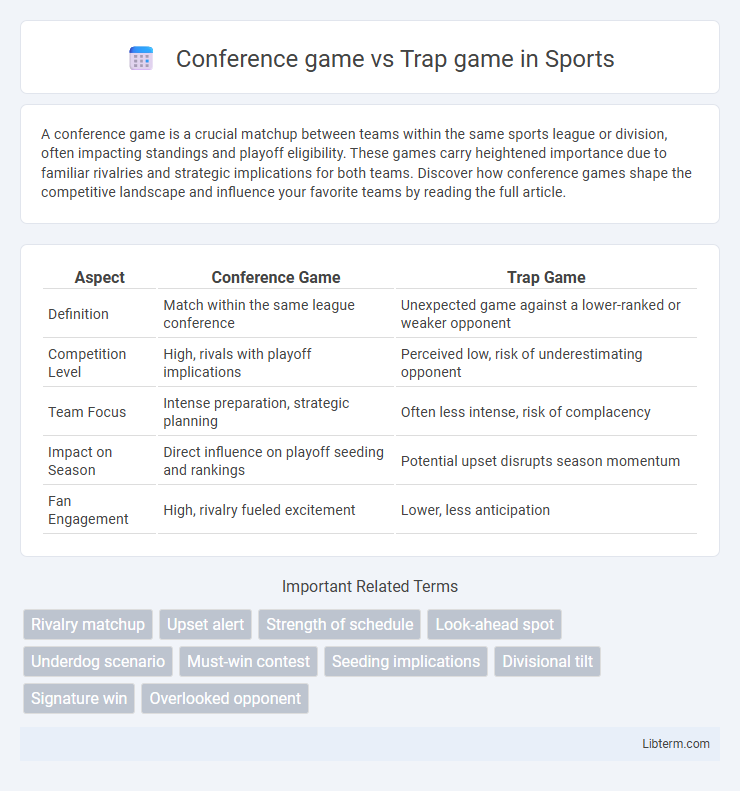A conference game is a crucial matchup between teams within the same sports league or division, often impacting standings and playoff eligibility. These games carry heightened importance due to familiar rivalries and strategic implications for both teams. Discover how conference games shape the competitive landscape and influence your favorite teams by reading the full article.
Table of Comparison
| Aspect | Conference Game | Trap Game |
|---|---|---|
| Definition | Match within the same league conference | Unexpected game against a lower-ranked or weaker opponent |
| Competition Level | High, rivals with playoff implications | Perceived low, risk of underestimating opponent |
| Team Focus | Intense preparation, strategic planning | Often less intense, risk of complacency |
| Impact on Season | Direct influence on playoff seeding and rankings | Potential upset disrupts season momentum |
| Fan Engagement | High, rivalry fueled excitement | Lower, less anticipation |
Understanding the Conference Game
The Conference game emphasizes strategic planning and long-term positioning within a specific group of competitors, fostering teamwork and adaptability to evolving scenarios. Understanding the Conference game requires analyzing team dynamics, strengths, and weaknesses to exploit patterns unique to the conference's style of play. Mastery of this game type involves anticipation of opponents' tactics and optimizing resource management under pressure.
What Defines a Trap Game?
A trap game is defined by the expectation of an easy win for a favored team, which often leads to underestimating a lesser-known or weaker opponent. These games occur outside the rigor and familiarity of conference competition, increasing unpredictability and risk of upset. Factors such as overconfidence, insufficient preparation, and emotional distractions frequently contribute to unexpected outcomes in trap games.
Key Differences: Conference vs Trap Games
Conference games involve matchups between teams within the same athletic conference, impacting conference standings, rivalries, and postseason qualifications. Trap games occur when a strong team faces a lower-ranked opponent who may be underestimated, increasing the risk of an upset. The key difference lies in the strategic preparation and stakes, with conference games emphasizing long-term competitive implications and trap games requiring heightened focus to avoid unexpected losses.
The Importance of Conference Games in Season Standings
Conference games directly impact a team's position in season standings by determining their rank within the specific group, influencing playoff eligibility and seeding. These games often showcase rivalries and consistent competition levels, providing a more accurate reflection of team strength relative to familiar opponents. Success in conference matchups is critical for securing championship opportunities and postseason advantages.
Psychological Factors in Trap Games
Trap games in sports often exploit psychological vulnerabilities by creating high-pressure situations that disrupt athletes' focus and decision-making. These games strategically induce anxiety, fostering overconfidence or panic, which negatively impacts performance consistency. Understanding common cognitive biases and stress responses in trap games enables players and coaches to develop mental resilience and tactical adaptability.
Historical Examples of Conference Game Upsets
Historical examples of conference game upsets spotlight moments when underdog teams defied expectations, shaking longstanding power dynamics within major NCAA conferences like the SEC, Big Ten, and ACC. Noteworthy instances include the 1984 Miami Hurricanes' upset over the heavily favored Florida Gators and the 2007 Stanford Cardinal's surprising victory over USC, emphasizing the unpredictability and intense competition inherent in conference matchups. These upsets often shift momentum in conference standings and impact postseason seedings, underscoring the critical importance of each game in shaping a team's championship trajectory.
Impact on Team Morale and Momentum
Conference games often carry higher stakes due to rivalries and playoff implications, significantly boosting team morale when won, as players feel validated against familiar opponents. Trap games, occurring against less formidable teams, can disrupt momentum if underestimated, leading to unexpected losses that dampen confidence and create uncertainty. Maintaining focus and preparation in both scenarios is crucial for sustaining positive momentum throughout the season.
Strategies for Avoiding Trap Game Pitfalls
To avoid trap game pitfalls, coaches emphasize thorough scouting and preparation, ensuring players maintain focus despite underestimating weaker opponents. Implementing disciplined game plans and maintaining consistent intensity throughout the match help counteract costly turnovers and lapses in concentration. Emphasizing situational awareness and adaptability enables teams to adjust strategies mid-game, minimizing the risk of unexpected losses in both conference and non-conference matchups.
Preparation Techniques for High-Stakes Conference Matchups
Preparation techniques for high-stakes conference matchups emphasize analyzing opponent tendencies through detailed film study and simulating game scenarios during practice sessions. Teams focus on situational drills that replicate pressure moments, enhancing decision-making speed and execution under stress. Incorporating data analytics on opponent formations and key player metrics further sharpens strategic adjustments before the game.
Conference Games and Playoff Implications
Conference games carry significant weight in determining playoff seeding and home-field advantages, directly impacting a team's postseason trajectory. Winning within the conference often boosts tiebreaker scenarios critical for playoff qualification, making these matchups highly strategic. Teams prioritize conference victories to secure favorable matchups and increase their chances of advancing deeper into the playoffs.
Conference game Infographic

 libterm.com
libterm.com